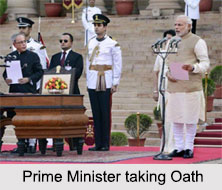 Indian Prime Ministers hold a unique position and is most powerful functionary of the Indian union. It is the Prime Minister who oversees the day-to-day functioning of the Government of India. He is the Head of the Government of India and the leader of the majority party in Parliament. The Prime Minister is assisted in this task by his Council of Ministers, comprising Cabinet Ministers, Ministers of State with Independent Charge, Ministers of State who work with Cabinet Ministers and Deputy Ministers. The Prime Minister is the strongest person in the cabinet under the Constitution of India.
Indian Prime Ministers hold a unique position and is most powerful functionary of the Indian union. It is the Prime Minister who oversees the day-to-day functioning of the Government of India. He is the Head of the Government of India and the leader of the majority party in Parliament. The Prime Minister is assisted in this task by his Council of Ministers, comprising Cabinet Ministers, Ministers of State with Independent Charge, Ministers of State who work with Cabinet Ministers and Deputy Ministers. The Prime Minister is the strongest person in the cabinet under the Constitution of India.
Eligibility of Indian Prime Ministers
Article 84 sets the principle eligibility to become the Prime Minister of India.
•He or she should be the citizen of India.
•He or she must be member of Lok Sabha or Rajya Sabha.
•A person should be minimum 25 years old in case of a seat in Lok Sabha and 30 years when it is Rajya Sabha.
•A person shall not be eligible for election as Prime Minister if he holds any office of profit under the Government of India or the Government of any State or under any local or other authority subject to the control any of the said Governments.
Election Procedure of Indian Prime Ministers
The elections for the Lok Sabha are held every five years and any Prime Minister tenure can only be 5 years. The Prime Minster is any Member of Parliament who enjoys the support of more than 50 percent of the Lok Sabha members. The President plays a major role in the appointment of the Prime Minister. After the elections for the Lok Sabha, the Indian President invites the leader of the largest political party in the Lok Sabha to form a government. If the leader has the maximum support of more the members of Lok Sabha which is currently 272, then he is sworn in as Prime Minster and can then appoint a Council of Ministers to assist him.
The Prime Minister is required to take oath in the presence of President of India before entering office, the oath of office and secrecy, as per the Third Schedule of the Constitution of India.
Role of Indian Prime Ministers
Virtually, the Prime Minister distributes portfolios amongst other ministers and can change them according to his or her will. As the Chairman of the Cabinet, the Prime Minister summons Cabinet meetings and acts as its President. The Prime Minister stands as a channel of communication between the President and the Cabinet on matters relating to policy though individual members have, access to the President in connection with, matters exclusively concerning their own departments. The priority of position of the Prime Minister is more marked in so far as he or she is required to coordinate the activities of the different departments and through co-ordination; the Prime Minister exercises the right of supervision and control over the entire department. As the Prime Minister, he is usually but not necessarily the Leader of the House to which he belongs. The Prime Minister is also the Chairman of the Planning Commission of India.
As head of the Council of Ministers, the Prime Minister oversees the work of all the Ministries. He presides over Cabinet meetings, which are normally held in the Cabinet Room of the Prime Minister"s Office. The Union Cabinet functions on the principle of collective responsibility.
List of Indian Prime Ministers
The names of the Indian Prime Ministers from the very beginning till now are listed below;
•Jawaharlal Nehru (1947-1964)
•Gulzari Lal Nanda (1964), (1966)
•Lal Bahadur Sashtri (1964-1966)
•Indira Gandhi (1966-1977), (1980-1984)
•Morarji Desai (1977-1979)
•Charan Singh (1979-1980)
•Rajiv Gandhi (1984-1989)
•V.P. Singh (1989-1990)
•Chandra Shekhar (1990-1991)
•P.V. Narasimha Rao (1991-1996)
•H.D. Devegowda (1996-1997)
•Dr. I.K. Gujral (1997-1998)
•Atal Bihari Vajpayee (1996), (1998-2004)
•Dr. Manmohan Singh (2004-2014)
•Narendra Modi (2014-present)
Indian Prime Ministers are the ones who exercises control over the Executive as well as the Parliament.






